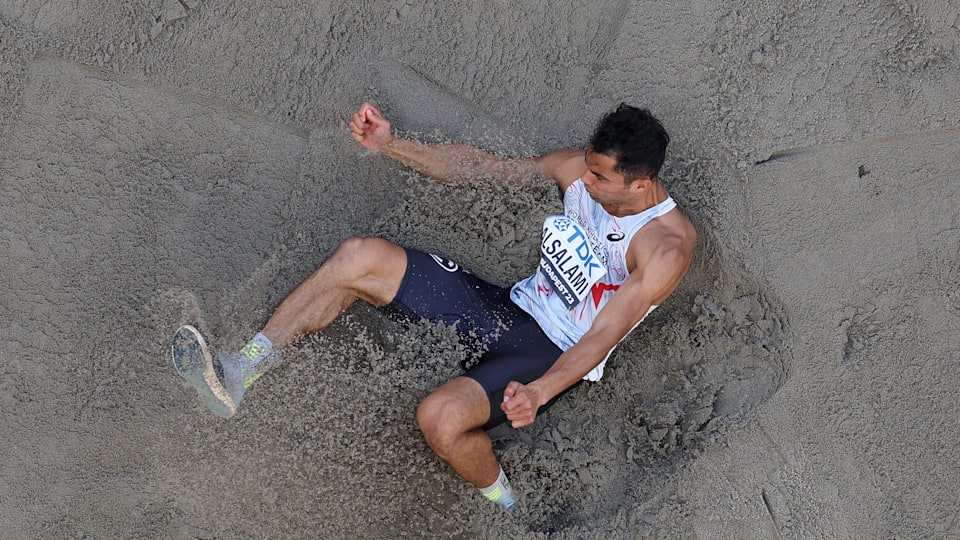Mohammad Alsalami: ‘I want to show that refugees can also deliver great performances’
The IOC scholarship recipient became the first refugee athlete to compete in a technical event at the World Athletics Championships. His next stop: Paris 2024.

Twelve years since war broke out in his home country of Syria and eight years since he settled as a refugee in Germany, Mohammad Amin Alsalami arrived at the National Athletics Centre in Budapest, Hungary, for the 2023 World Championships.
“To walk into a sold-out stadium was really cool,” Alsalami, who was named as an IOC scholarship recipient last December, told Olympics.com.
He’d soon be soaring: Alsalami jumped a 7.46m in his debut at a worlds to finish 33rd overall. His participation marked the first time a refugee athlete competed in a technical event at Worlds.
He had come so far – and not just into the sandy pit in Budapest.
“I could not practice [in Syria] without interruptions,” he explained. “I had to deal with a war. I fled; I suffered a big injury. There were some breaks [in my training].”
While competing at the Worlds was “a big dream,” he has his eyes firmly set on the Olympic Summer Games Paris 2024.
“I want to show that refugees are like normal athletes, that we can also deliver great performances,” Alsalami, 29, said in German. “And that motivates me on my road to becoming a world-class athlete.”
Mohammad Alsalami: 'You have to keep at it; not give up'
“I was always very fast, even as a kid,” Alsalami explained, having been encouraged by a sports teacher in Syria to take up long and triple jump at age 16. “My first coach was a long and triple jumper. He was my idol and he persuaded me to get into [it].”
After the war began in Syria in 2011, Alsalami attempted to keep training in Syria, but it became impossible with the constant threat of bombings and many injured people in the streets.
“It was impossible to live a calm life,” he said. “And I said to myself, ‘I need to go to Europe in order to lead a normal life.’”
Alsalami’s journey to Germany was “tough, very exhausting and very dangerous.” After arriving, he applied to go elsewhere to train, but couldn’t manage to get a Visa.
Opting to stay in Germany, he gave himself an honest talking to: “I told myself, ‘Hey, you have to accept that you are a refugee. You just have to keep at it and not give up. You have to be patient and believe in yourself that you can make it, regardless of whether it is in sport or real life.’”
BUDAPEST, HUNGARY: Mohammad Amin Alsalami of World Athletics Refugee Team competes in the Men's Long Jump Qualification during day five of the World Athletics Championships Budapest 2023 at National Athletics Centre on August 23, 2023 in Budapest, Hungary. (Photo by Stephen Pond/Getty Images for World Athletics)
IOC scholarship 'changed my life,' says Alsalami
When Alsalami found out that he would become part of the IOC refugee program, it “changed my life,” he explained.
“It was amazing,” he said. “[Before] I had to work really hard to finance my life and support myself. Thanks to the IOC support I can now focus more on training and my preparation for Paris.”
While it is a massive change for him, it is not a cure-all. And that’s part of what keeps driving him, Alsalami said.
“I will be honest with you. I still feel every day that I am a refugee and it is difficult to accept that, but I have to accept it,” he shared. “Practicing sport helps me massively. It distracts me, it gives me a different perspective and it creates new pictures in my head compared to what I experienced in Syria.”
He’d like to give the world new pictures, too, of what a refugee looks like. That remains at the top of his goal list for Paris.
Oh – and to make the long jump final.
“The Olympics are huge,” he said. “They are the dream of every athlete. I can already tell you that I will not forget this moment.”
“I am hoping to break the 8m barrier there and reach the Olympic final. I want to show what refugee athletes can do.”
